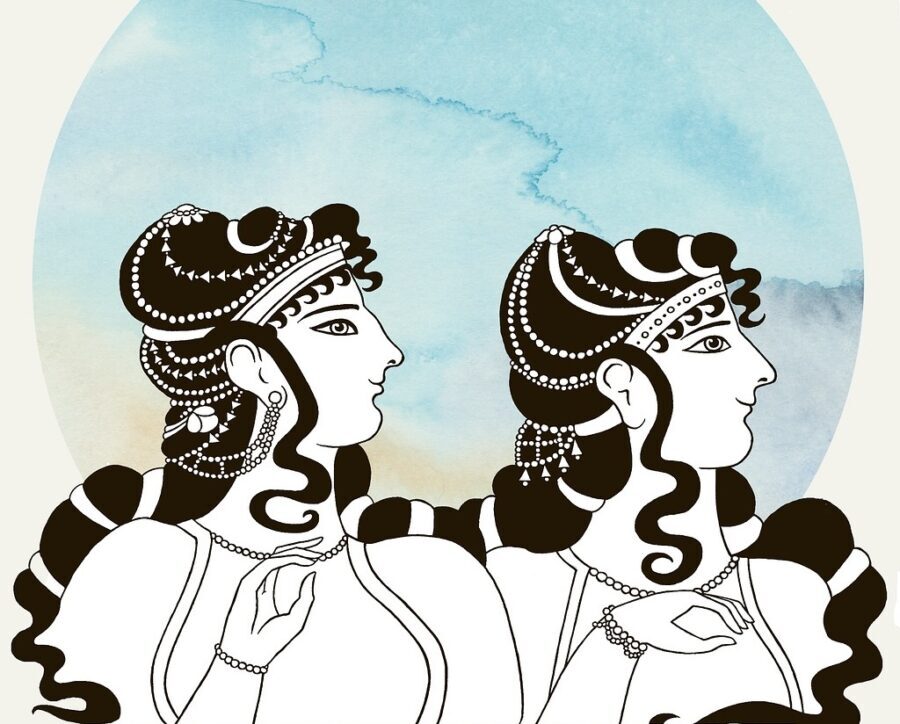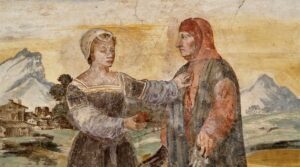
His storied life was dominated by two enduring loves: one of the heart, the other of the mind. The stunningly beautiful Laura was the object of the first; the romantic mystery of long ago Rome, the second. Both held him in thrall throughout his earthly days.
Born to a Florentine exile and his wife at Arezzo in Tuscany on July 20, 1304, Francesco Petrarch spent much of his boyhood in Avignon in Provence, in the south of France. In the schools there he was introduced to the Latin language, a subject to which he would remain passionately attached until his last breath. (Literally! As we shall see in due course.)
When his dear mother died in 1318, the precocious teenager mourned and honored her with exquisitely composed Latin verses of his own. By this time he was spending most of his time and all of his allowance tracking down the scarce copies of works by ancient authors. His father, an attorney, disdained his son’s feverish interest in such things as a waste of time and packed him off to the nearby University of Montpelier for law studies.
Some months into Francesco’s first term, the elder Petrarch, aiming to check up on his reluctant law student, paid a surprise visit to Francesco’s tiny, cluttered room. When the cranky parent spotted a volume of Vergil’s Aeneid and one of Cicero’s Rhetoric on a shelf, he angrily tossed both into the blazing fireplace. With the heartbroken young man reduced to sobs, the father was moved to rescue the two badly charred treasures from the flames.
By the year 1326, out from under his father’s thumb, Francesco had put aside all thoughts of a legal career and had turned his focus on becoming a published poet.
On Good Friday, April 6 of the following year, while attending services at the Church of Sainte Claire in Avignon he breathlessly beheld for the first time the lovely Laura who would become his version of Dante’s Beatrice who, sadly for the Divine Comedy composer, was already married. Dante had to resign himself to the cruel fact that his ardent love for one he considered the ideal of womanhood – beautiful, intelligent, dignified, modest, gentle, charismatic, with an air of mystery – would have to remain forever Platonic. He had to console himself with a collection of panegyrical poems to her, under the title La Vita Nuova.
The opening verses tell us much about the depth of Dante’s feelings:
Tanto gentile e tanto onesta pare la donna mia quand’ella
altrui saluta ch’ ogni lingua deven tremando muta e li
occhi no l’ardiscon di guadare…e par che sia una cosa
venuta da cielo in terra a miracol mostrare.
….
(She seems so honest and kind my lady when she greets
others that every tongue becomes tremblingly mute
and eyes dare not even glance at her,,,and it seems she
may be something come from Heaven down to earth
miraculously.)
Like Beatrice, Petrarch’s heartthrob was also wed by now, leaving him with nothing but a burning, unrequited love. Unlike Beatrice, however, who stood aloof and denied Dante even a passing glance, Laura — while remaining ever faithful to her marriage vows – managed, even if perhaps unwittingly, to keep alive the love and ambition of the young Petrarch by her grace and warmth and smiles.
______________________________
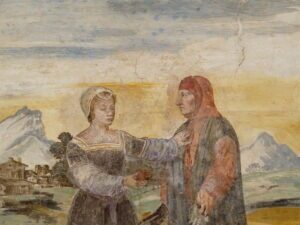
Laura and Petrarch. Sandra Cohen-Rose and Colin Rose, Creative Commons Attribution 2.0 Generic, Wikimedia Commons
______________________________
The young man softened his bitter disappointment by resolving to love her from afar, and immortalize her through his pen, making Laura the central figure of his Canzoniere, a vast harvest of 366 ardent love sonnets, written in Italian.
In one poem he tells of his first sighting of the woman of his dreams:
Ov’ Amore co’ begli occhi
cor m’ aperse
…e la’ v’ ella mi scorse
nel benedetto giorno
….
(Where Love opened my heart
with those lovely eyes
…and there where she noticed me
upon that holy day.)
In another, he depicts the object of his affection in an enchanting bucolic setting, seated on a sun-washed Spring day beneath a tree beside a murmuring brook:
Da bei rami scendea
(Dolce nella memoria)
Una pioggia di fior sovra il suo grembo.
Qual fior cadea sul lembo
Qual su le trecce bionde.
….
(From the beautiful branches there dropped
…How sweet the memory –
A shower of blossoms on her.
Some fell on her apron,
Others upon her blond tresses.)
…………………………
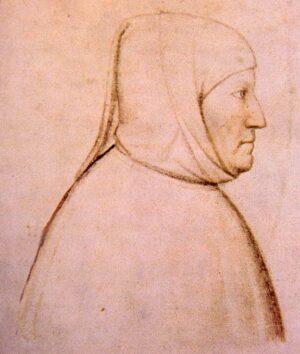 Meanwhile, his love of ancient literature was also growing ever more intense, taking him on long journeys in search of his idols – Vergil, Ovid, Horace, Livy, et al. The works of the fabled Roman authors, you see, had slipped into neglect and abandonment with the fall of Rome. The barbarian invaders had rampaged through the old empire, destroying everything in their path, among which were libraries and other centers of scholarship. The precious and priceless writings of the Classical Age virtually perished in this madness. The study of and interest in Roman literature had withered away, but Petrarch [portrait drawing, left] dedicated himself to doing something about it. For this, all Latin professors and their students, ever since, owe an enormous intellectual debt to him.
Meanwhile, his love of ancient literature was also growing ever more intense, taking him on long journeys in search of his idols – Vergil, Ovid, Horace, Livy, et al. The works of the fabled Roman authors, you see, had slipped into neglect and abandonment with the fall of Rome. The barbarian invaders had rampaged through the old empire, destroying everything in their path, among which were libraries and other centers of scholarship. The precious and priceless writings of the Classical Age virtually perished in this madness. The study of and interest in Roman literature had withered away, but Petrarch [portrait drawing, left] dedicated himself to doing something about it. For this, all Latin professors and their students, ever since, owe an enormous intellectual debt to him.
Never truly at ease in the world into which he was born, Petrarch sought to live among his friends of Classical Rome. In Latin literature he found ideals of truth and beauty, which he exhorted the whole Western World to reclaim. The wonders of antiquity clutched at his very soul. The past, he insisted, was the road to understanding the present and preparing for the future. He felt that the decline of humanity in Medieval times could be ascribed to mankind’s severance of ties to its own glorious past. Thus he thought it called for a renewal of knowledge that tied the present to antiquity. Consequently, he encouraged and fostered a return to primary sources by way of the study of the works of those long ago authors.
A tireless wandering classicist, he traveled throughout Italy and other parts of Europe in his quest for old manuscripts, however tattered they might be. He followed up rumors, chased down leads, made endless inquiries, bought shabby, worn codices at any price. Francesco even had friends and mere acquaintances on the lookout as well, urging them to forage among the bookshelves of monasteries, seminaries, academies, and other centers of learning. Driven by his unquenchable thirst for knowledge, he would read, annotate, and refurbish every treasured acquisition and then make multiple copies.
At Liege in Belgium he thrilled to his discovery of a dusty, cobwebbed copy of Cicero’s defense of Archias. During a sojourn in his native Arezzo, he stumbled upon a badly battered but still legible text of Quintilian. In Mantua he found Pliny’s Natural History. But it was in Verona, birthplace of Catullus, that Petrarch made the supreme discovery of his life. While scouting every nook and cranny of the cathedral library there, he unearthed from a huge pile of crumbled and crumpled old tomes a collection of Cicero’s Letters to Atticus, as well as monastic reproductions of the statesman’s correspondence with Quintus, his kid brother, and with Brutus. Petrarch’s tenacity was paying off. He was ecstatic!
These letters afforded glimpses of the social life of Rome in the first century before Christ. They also shed much light on the pulsating political landscape of the dying Roman Republic, and on Cicero’s complex personality.
The quintessential scholar pored over every line in an all-out effort to know Cicero like a living, breathing friend. The similarities between the two writers – separated by thirteen centuries – were numerous and noteworthy. Both were sensitive, cultured, idealistic, humane men of letters. Both were practitioners of an elegant florid style. Both sang the praises of the old Republic. In fact, Petrarch hoped to live to see the day of its resurrection.
Coming to the conclusion that genuine correspondence on everyday matters constituted a literary genre of its own (i.e. letters addressed to private individuals but meant for a public readership), he suddenly developed an itch for letter writing. He honed his skills by penning long rambling open messages, in Latin, to his contemporaries and to his fellow literati from old Roman times such as Horace, Ovid, Vergil, and Livy. And of course, Cicero.
Here are the opening lines of his first of two letters to him:
Franciscus Ciceroni suo salutem.
Epistolas tuas diu multumque
perquisitas atque ubi minime
rebar inventas, avidissime perlegi
….
(Greetings from Francesco to Cicero,
I have read most eagerly
your letters which I had sought
for such a long time and found
them where I least expected to.)
Petrarch continues, sometimes lauding Cicero for his decency, his intellect, his eloquence etc., but more often calling him out for his shortcomings:
“Now perhaps it’s time to listen to someone else’s advice and constructive criticism, to a fellow writer, that is, who greatly
admires you and treasures your very name.”
Petrarch goes on to mention, in passing, many of Cicero’s important and influential friends such as Pompey, Brutus and Octavian – and bitter foes such as Julius Caesar and Marc Antony. He chastises Cicero for his tendency toward inconsistency and even pettiness:
“In one breath you speak glowingly of such people as your
brother and his son, of Dionysiuis Pomponius (Cicero’s
boyhood tutor), of Dolabella (a politician and general who
happened also to be his son-in-law) and in another breath
you turn on them in your wrath. But perhaps such mood
swings I should overlook.”
Yet Petrarch continues to pile on, chiding Cicero for letting petty politics rankle him and cost him his normally proper and dignified bearing; for ignoring the wise counsel of his dear brother Quintus; for often failing to practice the stoicism he preached; for letting himself be swept into the vortex of Rome’s political turmoil instead of holding himself above the fray.
The fourteenth century A.D. correspondent closes his letter to the first century B.C. recipient with this lament:
“You would have been better off now in your old age if you
had never held high office, never boasted of your triumph
over Catiline the conspirator, never yearned for power and
fame, if you had lived out your senior years indulging the
peaceful life of the mind that you so cherished: reading,
philosophizing, meditating on the eternal life, not on this
evanescent existence, and savoring the tranquility of your
cozy country villas. Farewell my Cicero.”
The scholar/poet signed off citing his whereabouts whence he penned this letter:
“From Verona, a city on the banks of the Adige in
Transpadane, Italy, June 16 in the year of the Lord you
never knew, 1345.”
Six months later, Petrarch sends Cicero another letter, much less critical and far more adulatory:
“I’m afraid you found my previous letter offensive. What I
found fault with was the way you lived your life, not your
intellectual achievements, especially your mastery of
language. …You are the father of eloquence and so
many of us cherish and thank you for the elegance of your
Latin. Whatever talent I have as a writer of prose, I owe
to you. As for any success I enjoy in poetry, however, I
must say I am indebted to Publius Vergilius Maro (Vergil).
In your old age, you read works by him in his youth and
lavished great praise on them, and predicted a great
future for him…”
Petrarch continues in this vein for the rest of this rather lengthy epistle, and concludes with this “postmark.”
“From the land of the living, on the banks of the Rhone
In southern Gaul, (i.e. Avignon), December 19, 1345.”
So admiring of the words and deeds of the Classical authors was Petrarch that he sometimes found himself wishing that he had lived in their era so that he could have had the opportunity to meet them and know them in actuality rather than merely in his imagination.
He opens his letter to the historian Titus Livius (Livy) with these sentiments:
“I only wish, with Heaven permitting, either that I had lived
In your times, or you in mine, for I would have been all the
better for it. As it is though, I must content myself with
knowing you solely from your published works.”
Re: the condition of the books he found, he writes to the rhetorician Quintilian—–
“I just recently became acquainted with your literary talent,
having stumbled upon a mangled, shabby copy of your book,
On Oratory.
…..“Right at this very moment there might very well be –
somewhere on someone’s shelves, an edition of it in
good condition — without the owner having the slightest
idea of what an eminent guest is in his library.”
In a glowing message to the Roman historian Asinius Pollio, Petrarch gushes:
“Some years back I came up with the idea of sending social
letters to certain gifted authors of long ago, including you.
I congratulate you for your distinguished consulship, for your
brilliant mind and writings, and for a host of other
accomplishments; and for your wise decision to spend
the concluding years of your illustrious life in the pleasant
ambience of your idyllic villa up in Tusculum.” (Note:
Tusculum was a town in the Alban Hills, south of Rome.)
The ever scholarly Petrarch tried hard to learn Greek so that he might read, in the original, the Hellenic masters from across the Adriatic, particularly Homer; but he had scant success with the language. We learn this from his Latin letter to the author of the Iliad:
“I have long wanted to write to you if only I knew your native
tongue. I was not fortunate enough, however, to master it.”
Petrarch’s correspondence, with both his living and deceased friends, forge a record of life in the gloomy past of the Middle Ages in Europe and at the same time somewhat of an intimate diary of the Tuscan poet himself.
All his epistolary activities notwithstanding, Petrarch continued to find time and energy to produce some of the finest poetry ever written – much of it in Latin, the rest in Italian. His epic Africa, in Latin hexameters, extolled Rome’s victorious struggle against Hannibal of Carthage, while singling out, for the lion’s share of praise, the general Scipio, to whom the Roman Senate awarded the honorific: “Africanus” for his smashing conquest in the Third – and last – Punic War.
Another epic by Petrarch, Trionfi (Triumphs) composed in Italian, tells of a dream he had in which Humanity begins to move, ever so slowly but inexorably, toward a renewed belief and reverence for God.
Like Dante’s Divina Commedia, it was composed in the exceedingly difficult terza rima, a verse form consisting of tercets (i.e. three-line stanzas in which the second line rhymes with the first and third of the next stanza).
Petrarch’s abiding admiration of the glory that was Rome would induce him to return to the Eternal City from time to time. There he would lose himself in reverie amid the majestic rubble of the Forum Romanum. On one of his visits – April 1341 – in solemn ceremonies on the Capitoline Hill, he was crowned by the Senate with a laurel wreath and proclaimed the pre-eminent poet of his era.
He and his circle of fellow intellectuals, including Bocaccio, had by their enthusiasm for the art, architecture, and literature of Classical Rome, inaugurated a movement which came to be known as Humanism, and which was to refashion European culture. It also laid the groundwork for the great creative epoch that followed. We know it as the Renaissance.
Francesco Petrarch is a most splendid example of how an inquiring, thirsty mind can be stimulated and energized for life by exposure to Classical Studies. He would be the perfect “poster boy” for the perennial campaign to restore Latin to its once prominent place in the curriculum of elementary, secondary, and higher education.
This extraordinary Man-For-All-Seasons died at his desk at his country house in Arqua, in the Euganean Hills near Padua, on July 19, 1374, one day shy of his seventieth birthday. He was found slumped over an open volume of … Cicero.
____________________________
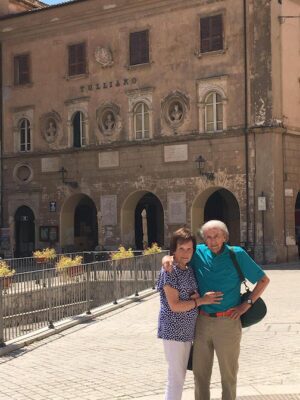
The author and his wife in the main piazza of Arpino, Cicero’s boyhood hometown. (Photo by Teresa Mastrobuoni.)
____________________________
Advertisement

See the incredible archaeology, architecture, and art of northern Spain. A unique tour with special expert guides and lecturers through the collaboration of Popular Archaeology Magazine and Stone & Compass Tours. Not to be missed. Read More About It: https://popular-archaeology.com/article/northern-spains-triple-a-archaeology-architecture-and-art/.
____________________________



